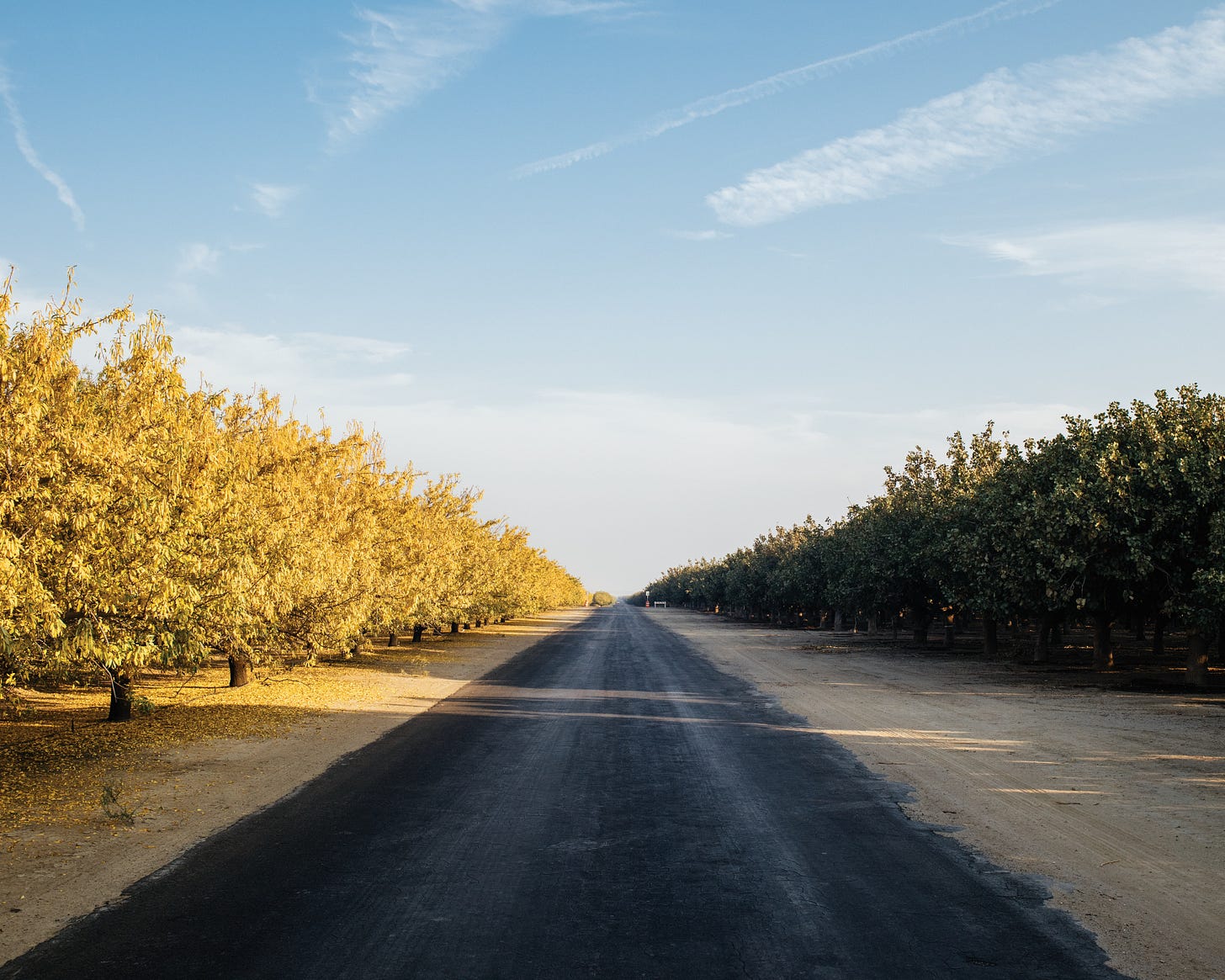A Kingdom from Dust (#351)
Plus: Sign up for our discussion of “When the Myth of Voter Fraud Comes for You”
Ever had a Cutie? 🍊
Or a bottle of Fiji water? Or a glass of pomegranate juice?
Maybe you prefer nuts — like maybe an almond? Or a pistachio, perhaps?
If you answered yes to any of those questions, you support the empire of billionaires Stewart and Lynda Resnick, the king and queen of California agriculture, who control not only hundreds of thousands of acres of land, but also billions of gallons of water every year, not to mention the livelihoods of thousands of mostly undocumented people who work in their vast fields and live in their company town, Lost Hills.
For that reason alone, I recommend that you read this week’s lead article, “A Kingdom from Dust,” a sweeping account that explores how two non-farming, kitsch-selling business people from the East coast built massive wealth by moving out west and making it big in California.
But if you’ve subscribed to this newsletter for any significant amount of time (hi there, long-time readers!), you know that I’m not going to include an 89-minute piece just because some folks struck it rich. (Except, of course, if they hacked the lottery – see “Jerry and Marge Go Large,” now a feel-good movie on Paramount+.)
No, it’s not that at all. Rather, I deeply appreciated this article because of what I learned about my home state – namely, how much power its big farmers wield, how little power its farmworkers possess, how messed up its water policies are, and how our desire for delicious produce in the supermarket is influencing climate change, contributing to wildfires, and literally making the land underneath our feet sink.
And on that delightful note, let’s get to the article! 😀 (I promise, it’s a good one.)
A Kingdom from Dust
If you asked me to introduce myself, I probably wouldn’t lead with “I’m Californian.” But the truth is I’ve lived here nearly all my life, and I don’t plan on moving anytime soon — no matter what Florida Governor Ron DeSantis says.
One big thing I’ve noticed about my California identity is that I remain mostly ignorant about the state’s history and economy. Sure, Miss Milanesio made us make a mission in fourth grade. But she certainly didn’t explain the nuances of water politics, or how agricultural barons transformed the land and exploited its people to extract a bounty of fruits and vegetables from the earth.
That’s why I’m grateful to journalist Mark Arax. His well-written article has it all. Not only will you meet Stewart and Lynda Resnick, but you’ll also learn about how they schemed their way to the top, stealing water to protect themselves from drought; how they built a company town, keeping their laborers dependent on philanthropy; and how they destroyed the environment, planting trees where they don’t grow and ripping out trees where they do.
And if you step back, as Mr. Arax encourages us to do, you’ll realize how fragile California is, and how dire our situation is — how we’ve managed to construct an enormous agricultural apparatus because of people’s ambitions for fortune, one that the country depends on, but one that fundamentally does not work, and one that will inevitably fail sooner rather than later.
After all, no matter how strong California dreaming is, there’s just no escaping the reality that 40 million people are living in a desert that’s getting drier.
➡️ Click here to read the article
+ No, despite what you’ve maybe seen on the web, and even though the Resnicks said so, pomegranate juice does not cure heart disease and erectile dysfunction.

This week at Article Club: Let’s annotate!
Last week, I revealed that we’ll be discussing “When the Myth of Voter Fraud Comes for You” on Sunday, July 24, 2:00 - 3:30 pm PT. This event will be free, on Zoom, and limited to 24 people. (Thank you to the 10 of you who have already signed up.) After a quick introduction, we’ll spend most of our time in small, facilitated discussion groups (5-7 people each).
There’s still time to join us if you’re interested. All you need to do is click the button below and sign up!
This week, we’re annotating the article. Here’s a copy we can annotate together. Annotating is a great way to connect with other Article Clubbers and share your thoughts about the piece, right inside the text. You can build on others’ comments or add your own. Try it, you’ll like it!
If you’re new to our Article Club, welcome! We look forward to meeting you and having your voice in the conversation. Feel free to reach out with questions. Also, here’s what you can expect this month.
Coming up this month
This week: We’ll annotate the article and share our first impressions.
Thursday, July 14: We’ll listen to Mr. Newkirk’s thoughts on the article.
Sunday, July 24: We’ll discuss the article with fellow Article Clubbers.
1 More Great Article For You
Last week’s poll indicated that many of you resonated with Dave Eggers’s account of how and why his book was banned from a South Dakota school district. His story reminded me of the time when all the copies of Native Son were removed in the middle of the night from my first school’s book room. Sadly, book bans are on the rise and will likely continue. That’s why I’m on the hunt for articles about librarians and communities that are fighting back. Here’s one:
How Libraries Came To Be Sanctuaries for LGBTQ Kids
By Beth Hawkins in The 74 Million
Don’t believe the stereotype that librarians are staid introverts who like everything tidy and just so. In reality, the opposite is true, as this article profiling Michael McConnell reveals. Growing up in the 1940s and 1950s, Mr. McConnell visited the local library to understand his same-sex attraction. After he wasn’t successful, he dedicated his career as a librarian to curate books and safe spaces for queer youth. His activism intensified after the Stonewall Uprising in 1969. He married his partner in 1971 and helped to make the American Library Association the first professional group with a queer committee formally advocating for LGBTQ rights. Now 80 years old, Mr. McConnell laments the recent backlash and the widespread banning of Two Grooms on a Cake, a book about his life. But he’s happy that LGBTQ-related books remain the most stolen from school and public libraries. That means there’s demand, and that his life’s work continues to be meaningful.
➡️ Click here to read the article
+ Last year, nearly 1,600 books were challenged, according to the ALA. Many librarians fear for their lives. One said, “There were comments about library staff, calling us groomers and pedophiles and saying we needed to be fired, we need to be jailed, we needed to be locked up, that all the books needed to be burned.”

Thank you for reading this week’s issue of The Highlighter Article Club. Hope you liked it. Please feel free ALWAYS to give me feedback — especially over the next few months, as I iterate on and figure out this new newsletter format. All you need to do is hit reply, email me, or leave me a voice message.
To our three new subscribers – including Matthew and Ronald – I hope you find the newsletter a solid addition to your email inbox. To our long-time subscribers (Quince! Querida! Quest!), you’re pretty great, too. VIP Sivan, thank you for sharing the newsletter and getting the word out.
If you like The Highlighter Article Club, please help it grow. I appreciate your support. Look at these ways you can help out!
📬 Forward today’s issue to a friend and urge them to subscribe. If they use this sign-up form, they can say you referred them, and when I find out, I will shower you with thanks and praise (and maybe a prize).
☕️ Buy me a coffee to express your love of the newsletter
❤️ Become a VIP member for $3 a month, like Jen and Loretta. You’ll join an esteemed group of readers who value the mission of The Highlighter.
On the other hand, if you no longer want to receive this newsletter, please feel free to unsubscribe. See you next Thursday at 9:10 am PT!







